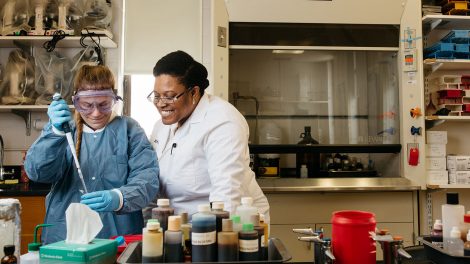The American Lung Association is highlighting the work of Black medical experts who are dedicated to eliminating lung health disparities
By Katie Neitz
The American Lung Association is featuring Khadijah A. Mitchell, Peter C.S. d’Aubermont, M.D., Scholar of Health and Life Sciences and assistant professor of biology, in an upcoming educational webinar and panel discussion. She will join other experts to discuss the link between African Americans and lung cancer, as African Americans are more likely to get and die from lung cancer than Americans from European descent, despite lower smoking rates.
In honor of Black History Month, the American Lung Association is highlighting the work of Black medical experts who are dedicated to eliminating lung health disparities.
Mitchell was invited based on her extensive experience researching health disparities and her passion for serving the community as a public health advocate.
The talk, “No Patient Left Behind: Black Men and Lung Cancer,” is a virtual event that will be held at 11 a.m. Friday, Feb. 19. You can register to attend.
Mitchell has spent most of her career investigating why Black populations have higher incidences of lung cancer. In recent years, she expanded her research to study kidney cancer, for which she received a $75,000 grant in 2019 from the Department of Defense Congressionally Directed Medical Research Programs.
“I’m excited about the American Lung Association event because it gives me an opportunity to share my lung cancer health disparities and health equity work on a national stage,” says Mitchell. “It also lets me have a conversation with the public, which will hopefully narrow knowledge gaps. I tell my students that it’s not enough for science to stay in the walls of the lab. It needs to be translated to the community to educate and help others.”
This is just the latest way Mitchell is helping those around her.
In 2020, she started co-leading a task force committee for the Pennsylvania Department of Health (PA DOH) aimed at mitigating the impact of COVID-19 among racial and ethnic minority groups. The group’s recommendations have been approved by the PA DOH Office of Health Equity (OHE), and as of early February 2021, were awaiting final sign off by Governor Tom Wolf.
“There are many African Americans who have had negative experiences with the U.S. health care system and have a lot of medical mistrust,” she says. “I’m trying to provide the education and tools so Black patients can feel like mini-experts and empower themselves during patient-provider interactions. This is known to promote trust building.”
The task force implemented faith-based and community-based COVID-19 testing and educational programming about the safety and effectiveness of vaccines at historically Black churches and mosques around the state. They also are planning a speakers bureau, featuring experts who can educate the public, as well as listening sessions in which government and industry officials will invite the public to share feedback and concerns.
Mitchell’s task force was already successful in assembling and distributing over 6,000 COVID-19 “care packages,” containing useful supplies, like masks, hand sanitizer, a digital thermometer, and hand wipes, to racial and ethnic minority groups in 87 cities across the state.

